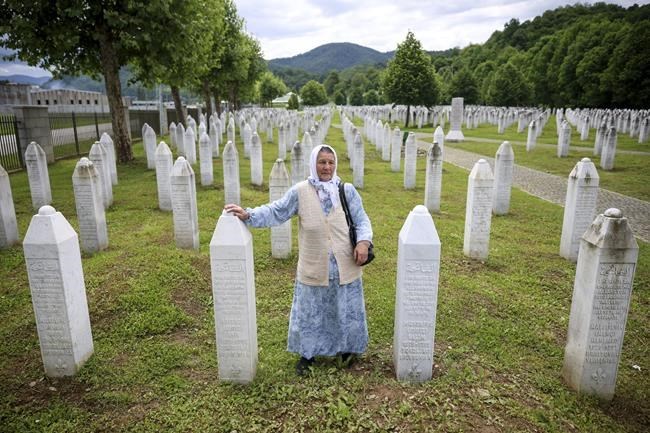
Sefika Mustafic mourns next to the graves of her two sons, victims of the Srebrenica genocide, in the Memorial Center in Potocari, Bosnia, Wednesday, May 22, 2024. On May 23, the United Nations General Assembly will be voting on a draft resolution declaring July 11 the International Day of Reflection and Commemoration of the 1995 genocide in Srebrenica. (AP Photo/Armin Durgut)
Republished May 22, 2024 - 11:34 PM
Original Publication Date May 22, 2024 - 7:06 AM
SREBRENICA, Bosnia-Herzegovina (AP) — The leader of Bosnia’s Serb-controlled territory reiterated a threat to secede from the Balkan country Wednesday, a day ahead of a U.N. vote on establishing an annual day to commemorate the 1995 genocide of more than 8,000 Bosnian Muslims by Bosnian Serbs.
Relatives of the victims, meanwhile, said that the vote would mark a historic day in ensuring that the deaths cannot be denied or forgotten.
The proposed U.N. resolution sponsored by Germany and Rwanda has been supported by the Bosniaks, who are mostly Muslim, but has sparked protests and a lobbying campaign against the measure by the Bosnian Serb president, Milorad Dodik, and the populist president of neighboring Serbia, Aleksandar Vucic.
The two leaders say the resolution would brand all Serbs as genocidal, although the draft does not explicitly mention Serbs as culprits. Both Serbia and Bosnian Serbs have denied that genocide happened in Srebrenica although this has been established by two U.N. courts.
For the women who lost their loved ones in the massacre, any denial of the scope of the crime has meant more grief. This is why the U.N. vote “means a lot" for victims, truth and justice, said Munira Subasic, from the prominent Mothers of Srebrenica group.
“People who live in lies, who don’t know the truth, they will need this U.N. resolution more than we do," Subasic said, adding that she was referring to “genocide deniers” among Bosnian Serbs and in Serbia. “They will not be able to glorify war criminals any more.”
“We expect a fair decision tomorrow, a decision that will tell us, the families, that there is justice in the world, that there is humanity,” added Nura Begovic, who also lost several family members in Srebrenica.
On July 11, 1995, Bosnian Serbs overran a U.N.-protected safe area in Srebrenica. They separated at least 8,000 Muslim Bosniak men and boys from their wives, mothers and sisters and slaughtered them.
The 193-member U.N. General Assembly plans to debate the resolution Thursday to be followed by a vote. Serbs have the support of their allies Russia and China, while the resolution is supported by the U.S. and most other Western states.
Dodik, who is president of Republika Srpska, which comprises about half of Bosnia, said on the social media platform X that the U.N. resolution is being forced on the country by supporters of Muslim Bosniaks and that it will split up the country. He said his government could formally propose a separation on Thursday
“Bosnia and Herzegovina has reached its end, or to be more precise, it was brought to an end by those who swore to it,” Dodik said on X. “All that remains is for us all to make an effort to be good neighbors and to part in peace.”
Dodik has made several such threats in the past to have the Serb-controlled territories secede from Bosnia and join with neighboring Serbia. He and some other Bosnian Serb officials are under U.S. and British sanctions partly for jeopardizing a U.S. peace plan that ended Bosnia’s 1992-95 war.
The Srebrenica killings were the bloody culmination of the war, which came after the breakup of Yugoslavia unleashed nationalist passions and territorial ambitions that set Bosnian Serbs against the country’s two other main ethnic populations, Croats and Muslim Bosniaks.
The International Court of Justice, the U.N.’s highest tribunal, determined in 2007 that the acts committed in Srebrenica constituted genocide, and the court’s determination is included in the draft resolution. It was Europe’s first genocide since the Nazi Holocaust in World War II.
Serbia’s President Vucic and his government have been campaigning both at the U.N. and among developing countries to win support for a “no” vote. Approval requires a majority of those voting.
In a massive campaign in both Serbia and the Serb-controlled half of Bosnia, organizers have put up billboards and video beams reading “Serbs are not genocidal people."
Vucic and Dodik, both pro-Russian politicians, also have argued against the resolution by saying it raises the possibility of having to pay war damages. Local analysts say Serb leaders, including Vucic, also fear they could be put on trial for active participation in the Bosnian bloodshed.
The draft resolution condemns “without reservation any denial of the Srebrenica genocide as a historical event.” It also “condemns without reservation actions that glorify those convicted of war crimes, crimes against humanity and genocide by international courts, including those responsible for the Srebrenica genocide.”
Bosnian Serb wartime political leader Radovan Karadzic and his military commander, Ratko Mladic, were both convicted of genocide in Srebrenica by a special U.N. war crimes tribunal. In all, the tribunal and courts in the Balkans have sentenced close to 50 Bosnian Serb wartime officials to lengthy prison terms.
Most Serbian and Bosnian Serb officials still celebrate Karadzic and Mladic as national heroes. They continue to downplay or even deny the Srebrenica killings, which has deeply offended relatives of the massacre victims and survivors.
“I can never bring my three sons back … also my husband and my grandson, five men from my house alone,” said Mejra Dzogaz as she looked at a vast memorial center in Srebrenica comprising thousands of white tomb stones for the victims found and buried so far.
“What are we supposed to show to prove (genocide?) asked Dzogaz. "What? Look at this memorial center here.”
——
AP Writers Jovana Gec and Dusan Stojanovic contributed to this report from Belgrade, Serbia.
News from © The Associated Press, 2024